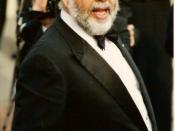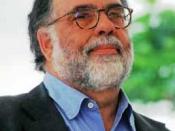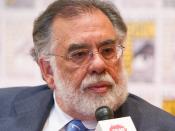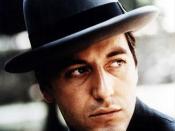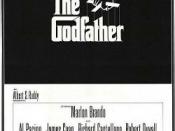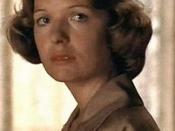Alice Cacioppo 2-26-02 Ms. Avery Final Draft: Movie Paper THE GODFATHER In The Godfather, Francis Ford Coppola builds the complex and dramatic Corleone family, which is built on pride, love, and crime. Murder and intrigue for business advantage are the principal mechanisms by which this world moves. In The Godfather film the law of the civil order has been replaced by the iron law of familial self-preservation in the name of the father. This is why the story of Michael and the development of his character is so important.
As the protagonist of the story Michael Corleone is the modern successor to the prewar ways of his father. With both war experience and a college degree, he creates a new era in the world of business. Like his father, however, Michael?s rise to power and his operational legitimacy are founded on a murder. The transformation of his personality (?That?s my family, Kay, not me?) toward ruthlessness is, however, a requirement to occupy his future position.
Coppola elicits from actors, individually and together, performances that take the character across the changes of time and experience to render a definitive interpretation of the story as the decline of honor in the ascent to power. He shapes Don Corleone?s aging, judicious, distracted benevolence with the emergence of Michael?s movement away from simple filial duty toward the calculating, aggressive, and hypocritical killer of family and foe that he becomes. After his father is gunned down, Michael?s struggle between virtue, loyalty and revenge, inevitably lead to the pivotal scene in The Godfather when Michael elicits revenge on Sollozzo and McCluskey. By doing what was necessary to eliminate the threat to his father, Michael inevitably goes from wanting nothing to do with the family, to having very much to do with them. This drastic change in Michael, and the development of his character is shown from the beginning to the end. Michael goes from telling Kay that he is nothing like his family in the beginning to having her watch in astonishment as the men around him kiss his hand out of respect for their new Don Michael Corleone in the end.
Coppola uses a cinematic style which exists principally through framing and composition of individual shots. It is almost transparent in the way it displays the theatricality of the action taking place. The framelines and the lighting create dark spaces which are paralleled by zones of significant illumination that give meaning to the movement and looks of the actors. The cinematic style he uses discloses the drama rather than presents it, and the frames function both to recount the story and interpert it.
